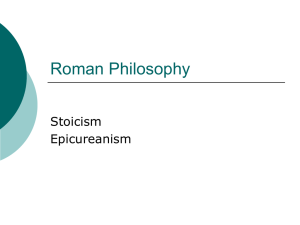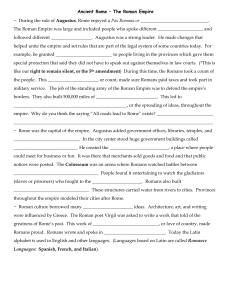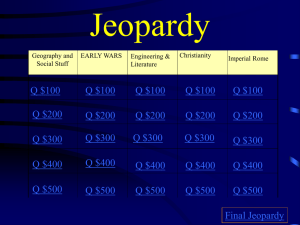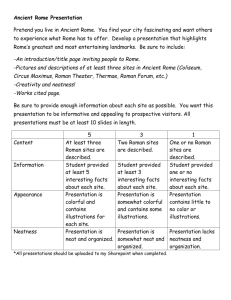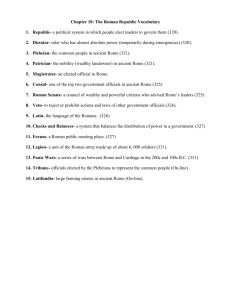2013-2014 Pre-AP Study Guide Chapter 10 – Ancient Rome
advertisement
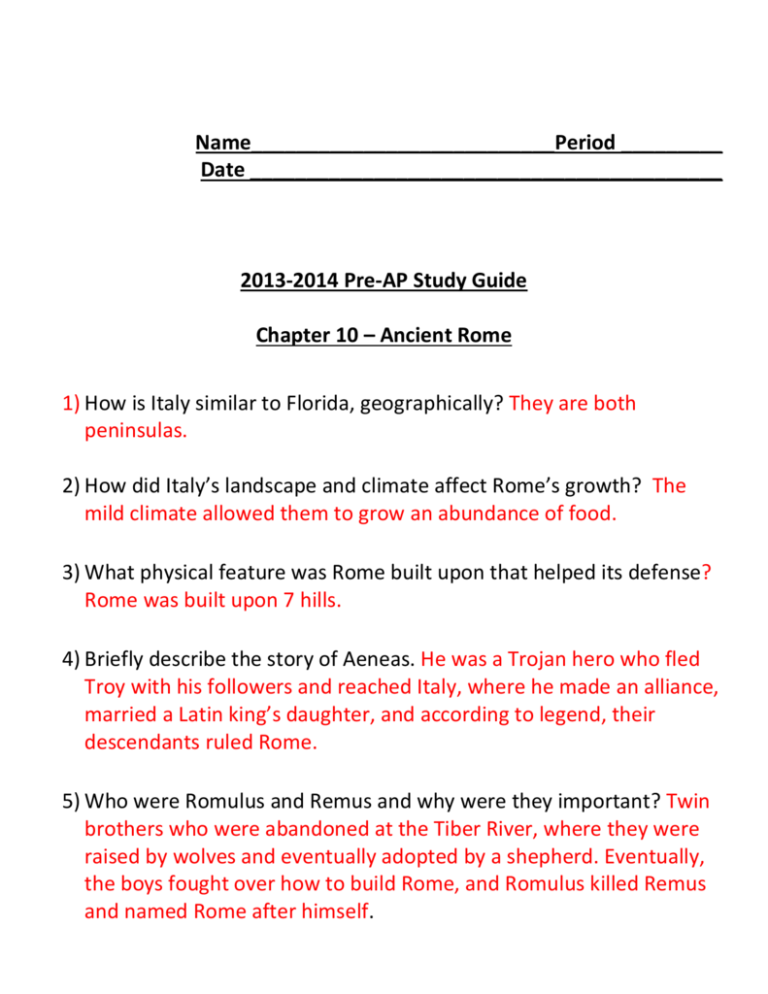
Name___________________________Period _________ Date __________________________________________ 2013-2014 Pre-AP Study Guide Chapter 10 – Ancient Rome 1) How is Italy similar to Florida, geographically? They are both peninsulas. 2) How did Italy’s landscape and climate affect Rome’s growth? The mild climate allowed them to grow an abundance of food. 3) What physical feature was Rome built upon that helped its defense? Rome was built upon 7 hills. 4) Briefly describe the story of Aeneas. He was a Trojan hero who fled Troy with his followers and reached Italy, where he made an alliance, married a Latin king’s daughter, and according to legend, their descendants ruled Rome. 5) Who were Romulus and Remus and why were they important? Twin brothers who were abandoned at the Tiber River, where they were raised by wolves and eventually adopted by a shepherd. Eventually, the boys fought over how to build Rome, and Romulus killed Remus and named Rome after himself. 6) Rome’s last three kings were Etruscan. 7) Why did the Roman nobles overthrow their last king? He was cruel. 8) What type of government did the Romans have after the monarchy and how it was different? Republic, where they elected officials. 9) Why was Rome NOT considered to be a democracy? All the wealthy people had all the power, while poor people had very little. 10) Who were plebeians and patricians and what was their relationship like in ancient Rome? Plebeians were common people who wanted more say in government, while patricians were nobles who held the majority of the power. There was conflict due to the imbalance of power. 11) What is a Tripartite? Three part government 12) Define the following terms (know their jobs, importance, who could hold which office, and how they worked together): Senate - a council of wealthy and powerful Romans that advised the city’s leaders; served for life and gained control of financial affairs. Consuls – the two most powerful magistrates in Rome who were elected one year to run the city and lead the army Assemblies – represented the common people and were made up of plebeians and patricians; primary job was to elect magistrates Tribunes - served for one year, elected by plebeians, and had the power to veto other officials. 13) Why were the Twelve Tables developed? People did not want to be punished for laws they were unaware of. 14) How was the Roman law of the Twelve Tables similar to the U.S. Constitution? They were both written to protect people’s rights 15) What is the power of checks and balances? Checks and balances keep any one part of a government from becoming stronger or more influential than the others (balance of power) 16) Which event after 88 BC had the most important effect on the Roman republic’s government? Marius gained political power through his loyal troops and this led to power struggles with other generals. 17) How were Romans who were magistrates and Romans who took part in assemblies similar? The assemblies elected magistrates and both groups served for one year. 18) Where was the center of life in ancient Rome? Forum 19) Why did the Roman trade network grow? They couldn’t produce enough food, so merchants brought in food from all over Mediterranean. 20) Why did many nearby countries declare war on Rome? Rome paid Gaul to go away, so others wanted to take advantage of the same opportunity. 21) Who were Tiberius and Gaius Gracchus? Brothers who served as tribunes who fought for the rights of the poor and were murdered for efforts. 22) How did Roman politics change after the Gracchus brothers were murdered? Romans saw violence as a political weapon. 23) Who attacked Rome in 218 B.C.? Carthage/Hannibal 24) What is a legion? A group of up to 6000 Roman soldiers who divided and attacked in groups of 100 25) What does veto mean? Latin for “I forbid” 26) Which culture greatly influenced the Romans? The Greeks 27) On the map below, label the following: Rome, Adriatic Sea, Tyrrhenian Sea, Mediterranean Sea, Ionian Sea, Po River, Tiber River, Corsica, Sardinia, Sicily, Carthage, Alps, and Apennines (MAP IS IN ISN) 28) Fill in the cause and effect for each of the Punic Wars, include who was involved. War Cause Effect 1st Punic Rome and Carthage wanted Fighting lasted 20 years, War control of Sicily but Rome finally defeated Carthage and forced them to pay huge fine 2nd Punic Carthage was trying to Romans defeated them War expand into Spain at Zama and made them pay more $$ Chapter 11- Rome and Christianity 3rd Punic Rome wanted to eliminate War competition Totally conquered Carthage by burning Carthage, salting fields, and capturing people 29) Who was Julius Caesar? Famous Roman general, was in First Triumvirate, ignored the Senate’s orders, defeated Pompey’s forces and declared himself dictator for life 30) Why did the Senate order Caesar to come home rather than crossing the Rubicon into Italy with his army? They wanted Pompey to rule alone and were worried that Caesar was growing too popular and would try to take over. 31) Which territory did Caesar capture between 58-50 B.C.? Gaul, which is modern day France. 32) What did Octavian do after Caesar’s death? He formed a Second Triumvirate and avenged Caesar’s death by killing his murderers in battle. 33) Who was in the First Triumvirate? Caesar, Crassus, and Pompey 34) How did Octavian become sole ruler of Rome? He defeated Antony and Cleopatra’s forces at the Battle of Actium, and then they committed suicide. 35) Who was also known as Augustus, and what does that name mean? Octavian was known as Augustus and it means “revered one”. 36) What was the “Golden Age of Peace and Prosperity” in Rome known as? Pax Romana, which was the 200 years of peace 37) Why did the Romans nickname the Mediterranean “Our Sea”? They had conquered almost the entire Mediterranean region and nicknamed it mare nostrum (Latin for “our sea”) to indicate their territory. 38) Why was land added to the Roman Empire? As they conquered new territories, they expanded trade, controlled their neighbors, and had more resources. 39) What architectural achievement did Romans use to help them build an open area within a building? Vaults, which are several arches built next to one another 40) Describe the importance of arches in Roman architecture? Arches provided more stability to large buildings, which made them more sound; therefore, many ancient Roman bridges and buildings still stand today. 41) Why were Roman roads built? To connect the empire, so soldiers could defend it more easily. 42) Who was Galen? Galen was a Greek surgeon whom Romans studied to help further medicine. Galen studied the body and noted the differences between arteries and veins. 43) Who wrote the Aeneid and what was it about? Virgil wrote the Aeneid, which was about a Trojan hero, Aeneas, who fled Troy with his followers and ended up in Rome, where he made an alliance and married a Latin king’s daughter. Roman legend says their descendants rule Rome. 44) What factors helped spread the Roman language? Trade and conquest 45) When the Romans conquered people, how did they typically treat them? How did this contribute to their success? They allowed conquered people to keep their own beliefs and customs, so they were less likely to revolt. 46) What did the emperor Hadrian think would happen by banning Jewish rituals? They would lose their desire for independence and give up their fight 47) Why would Roman government ban a religion? If they saw it as a political threat. 48) What is Christianity? A religion based on the life and teachings of Jesus Christ. 49) Define messiah God’s anointed one 50) What is the Bible? Which part tells about the life and teachings of Jesus Christ? The Bible is the holy book of the religion of Christianity. The Old Testament is similar to the Hebrew Bible, which tells history and ideas of the Hebrew and Jewish people. The second part, the New Testament tells the life and teachings of Jesus. 51) Define crucifixion a type of execution in which a person was nailed to a cross. 52) Define resurrection Jesus’ rise from the dead 53) Who were the apostles? The 12 disciples whom Jesus chose to receive special training. 54) Who was Paul? Paul of Tarsus was a disciple who spread Jesus’ teachings all throughout the Roman world. His ideas helped the Christian church break away from Judaism. 55) Define martyrs people who are willing to die for their beliefs. 56) What is persecution? punishment against a group because of its beliefs. 57) Which two Christian teachings are also similar to those found in Jewish teachings? Love God and love each other. 58) Which Roman Emperor lifted the ban on Christianity in the early 300s? Constantine 59) How are Christianity and Judaism related? Jews use the Old Testament of the Bible; whereas, Christians include all of the Bible (Old and New Testaments). Christianity is based upon Jewish teachings. 60) Why did Roman emperors by the end of the AD 100s start giving up land the Roman army conquered? They thought the empire was too large to control 61) Who was Diocletian and what did he do to make it easier to rule Rome? Became emperor in the late 200s and divided the empire into eastern and western empires and named a co-emperor, so it was less area to rule for each person. 62) Why did the Romans make payments to the Goths? They made payments, so the Goths wouldn’t attack Rome. 63) What was Emperor Justinian’s main goal? Justinian wanted to reunite the Roman Empire. 64) Who were the Visigoths? Visigoths destroyed Rome in 410 65) List the factors that caused the Roman Empire to fall. Too large to defend, corruption in the gov, schools closed, taxes and prices increased, communication was difficult, poverty increased 66) What contribution did Justinian make that guaranteed fair treatment for everyone? He organized Christian laws that gave fair treatment to everyone, which were called Justinian’s Law Code. 67) How did Theodora impact the riots during her husband’s rule? She convinced her husband to stay and FIGHT! 68) What was the Eastern Roman Empire called? Byzantine Empire 69) Why was Constantinople important? After the Roman Empire was divided into Eastern and Western Empires, Constantine moved the capital to Constantinople. 70) What language did most people speak in the Byzantine Empire? Greek


